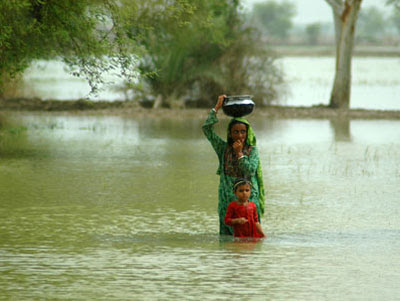Venezuela: Land reform, food sovereignty and agroecology

By Alan Broughton
Australia: Swing to Greens a shift to left as neither major capitalist party wins a mandate

By Peter Boyle
August 24, 2010 -- Green Left Weekly -- By denying both the ruling Australian Labor Party (ALP) and the opposition Liberal Party-National Party coalition an outright majority, in primary votes and in federal House of Representatives (lower house) and Senate (upper house), Australian electors on August 21 voted “neither of the above” for the traditional parties of government. The result after election night was a hung parliament, with several rural independent MPs and one Greens MP to decide which party will form the next government.
This followed an election campaign in which the major parties conducted an ugly race to the right, most notoriously by scapegoating the few thousand desperate refugees who attempt to get to Australia on boats.
Pakistan: The flood disaster and the way out

By the Labour Party Pakistan (Karachi) and the National Trade Union Federation
South Africa: COSATU's Zwelinzima Vavi's Ruth First Memorial Lecture

Britain: What now for the Green Party?

By Peter Shield
August 17, 2010 -- The Green Party of England and Wales has made some major breakthroughs over the couple of years, the election of Caroline Lucas to the British parliament was one of the few bright points on an otherwise dismal election night on May 6, 2010. At a local level the Green Party now has just over 120 councillors and the two members of the European Parliament (MEPs). The problem however is that the election showed up how patchy and locally concentrated its support base actually is. With the Autumn party conference approaching what are challenges facing the Green Party.
Afghans mark Independence Day with anti-occupation protests

By Derrick O'Keefe
Rabble.ca -- August 19, 2010 marks 91 years since Afghanistan gained its freedom from the British empire, following three bloody wars of independence. US Secretary of State Hilary Clinton has issued a video statement to mark the occasion. It's worth watching or reading the text in full, if only to appreciate the new empire's irony-laden platitudes.
This August 19th, on behalf of President Obama and the American people, I want to congratulate the people of Afghanistan on 91 years of independence.
James P. Cannon: An introduction

[This the introduction to Building the Revolutionary Party: An Introduction to James P. Cannon (Resistance Books: Chippendale, 1997). Dave Holmes is now a leader of the Socialist Alliance in Melbourne. This and other writings are also available at Dave Holmes' blog, Arguing for Socialism.]
By Dave Holmes
James P. Cannon was a pioneer of the Communist Party of the United States and one of its central leaders in the 1920s. Breaking with the Stalinised CP in 1928 he founded the US Trotskyist movement and played the decisive role in building it for over three decades.
Britain: Build opposition to the `slash and burn' coalition

By Alan Thornett
August 18, 2010 -- Socialist Resistance -- Britain’s first coalition government since the war has completed its first parliamentary session. "Coalition", however, is something of a sick misnomer. What we have is a right-wing Thatcherite, small-state, slash-and-burn Tory government, propped up by the cringing Liberal Democrats (Lib Dems), with a cuts and privatisation agenda which goes well beyond anything Thatcher herself was able to envisage.
Prime Minister David Cameron has emerged as the most ideologically driven Conservative Party (Tory) leader of modern times.
Pakistan flood catastrophe: West gives `billions for killing, little for life'

By John Passant
August 15, 2010 -- The floods in Pakistan have threatened the lives and safety of more than 20 million people. Millions have lost everything. Now hunger and disease haunt the country. Dysentery and cholera are gaining a foothold as people without homes starve and kids without Western help die.
The US gives the Pakistan government US$1 billion a year to fight "militants". It has increased its flood aid contribution from $10 million to $25 million. That’s right. Its aid figures is millions, not billions.
That’s because for US imperialism cowering the world before its might is much more important than providing aid to people affected by the floods.
Repay historic debt to Haiti: An open letter to French President Nicolas Sarkozy
CRIME activists fool the media with a fake announcement that France would finally pay its 17 billion euro historic debt.
By Derrick O'Keefe
Bolivia: Warning signs as social tensions erupt

By Federico Fuentes
August 15, 2010 -- Green Left Weekly -- Recent scenes of roadblocks, strikes and even the dynamiting of a vice-minister’s home in the Bolivian department (administrative district) of Potosi, reminiscent of the days of previous neoliberal governments, have left many asking themselves what is really going on in the “new” Bolivia of Indigenous President Evo Morales.
Since July 29, the city of Potosi, which has 160,000 inhabitants, has ground to a halt. Locals are up in arms over what they perceive to be a lack of support for regional development on the part of the national government. Potosi is Bolivia’s poorest department but the most important for the mining sector, which is on the verge of surpassing gas as the country’s principal export because of rising mineral prices.

